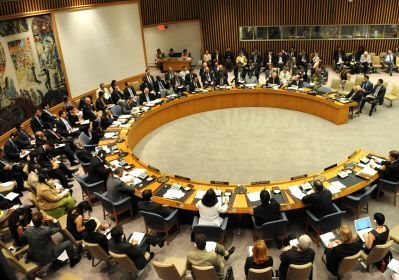The U.N. Security Council appeared to have begun discussing potential measures for dealing with Seoul’s claims that North Korea sank a South Korean warship earlier this year.
The Council held the first round of informal discussions related to the sinking of the Cheonan after it received a briefing by a multinational team of investigators led by South Korea on Monday (New York time), diplomatic sources said Tuesday.
“This means that the discussion process has begun,” said one source on the condition of anonymity.
He said that additional informal discussions would likely follow.
The government here seemed to be expecting a chairman’s statement regarding the Cheonan.
Officials stressed that such a statement would not be less significant than a resolution depending on the contents of such a statement.
In the document, the government is reportedly hoping to verify North Korea‘s involvement and demand an apology, along with a promise for preventive measures.
The two Koreas on Monday respectively made their case to the15 members of the U.N. Security Council on how the organization should respond to the sinking of the Cheonan.
The multinational investigation team represented by South Korea’s U.N. Ambassador Park In-kook held a question and answer session after a screening of video footage showing North Korean torpedo parts being pulled out of the site of the sinking.
Shortly after the two-hour session, the North Korean mission at the U.N. also briefed the Council to rebuke Seoul's claims.
In what was called an "informal interactive dialogue," the North claimed that it was not inolved in the Cheonan sinking in any way.
North Korea’s ambassador to the U.N. Shin Seon-ho reportedly said the North “was not related to the Cheonan.” He also said the forensic evidence presented by the multinational investigation team was “unacceptable,” according to Amb. Pak Dok-hun, deputy chief of North Korea’s mission at the U.N.
More such disputes between the two Koreas are likely to come as the North Korean mission said it would be holding a related press conference.
Seoul referred the Cheonan issue to the U.N. after the team in May concluded that a torpedo manufactured by Pyongyang had split the Cheonan in two, killing 46 sailors.
The two biggest factors in drawing out an effective U.N. response are China and Russia. The two nations hold veto power and may prevent the U.N. from taking punitive action against Pyongyang.
France and the U.S. reportedly expressed support for the investigation results and called for a strong punishment of the North.
“We offered sufficient explanations,” Yoon Duk-yong, a scientist who headed the Cheonan investigation, told reporters after the briefing.
Yoon said his team also urged the Council to respond appropriately to North Korea’s provocations.
Following the briefing, the Security Council warned the two Koreas against escalating regional tension.
South Korea has been upping the ante against the North in the aftermath of the investigation results.
President Lee Myung-bak pledged to take severe measures to promote national security, including those for punishing the North.
Inter-Korean trade has been halted, and operations at a joint industrial complex in the border city of Gaeseong are being kept at a minimum.
Seoul also said it would be re-engaging in anti-North Korean propaganda programs but the campaign has been put on hold following an explosive response from the North.
Pyongyang is said to fear such campaigns the most for they drive the North Koreans away from their regime.
The North initially said it views the investigation and Seoul’s accusations as an “act of war.”
On Saturday, the communist regime threatened that its armed forces “will launch an all-out military strike” to blow up propaganda loudspeaker facilities the South has installed along the heavily armed border and turn Seoul into a “sea of flame.”
Washington, Seoul’s strongest ally, has shown complete support for the Cheonan incident.
For further consultations on the ship sinking and dealings with the North, Kurt Campbell, U.S. Assistant Secretary of State, is to visit Seoul for a two-day trip from Wednesday.
The visit comes less than a month since Secretary of State Hillary Clinton visited as a part of her Asian tour. Clinton at the time manifested staunch support for Seoul.
Foreign Ministry officials here said the Cheonan, along with the schedule and agenda for the upcoming meetings between U.S. and South Korean foreign and defense ministers scheduled for July are expected to be discussed when Campbell arrives.
Among the officials the assistant secretary meets will be Vice Foreign Minister Chun Young-woo who is in charge of handling U.N. affairs.
 |
| Members of the U.N. Security Council meet at the United Nations, on May 31. (AP-Yonhap) |
|